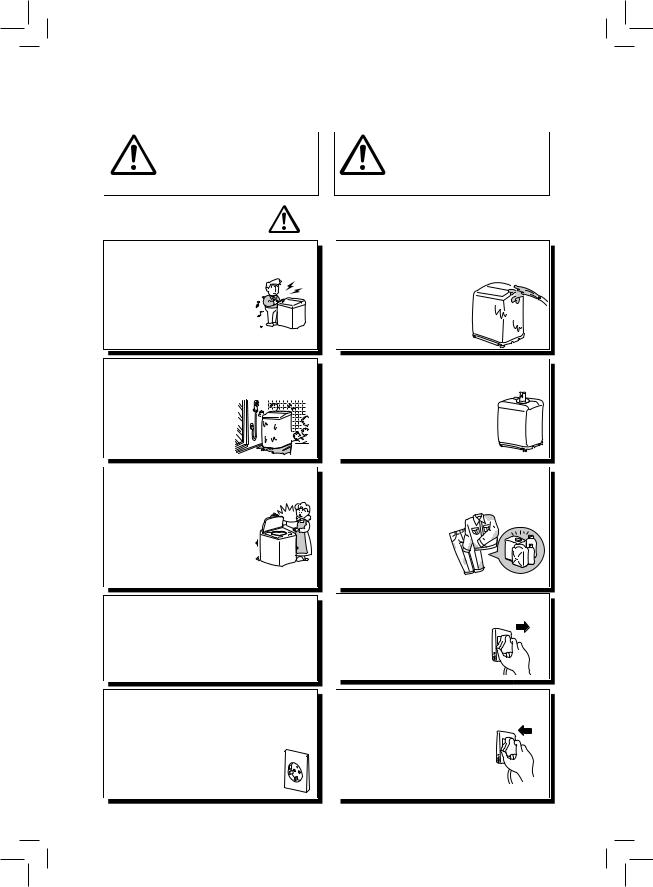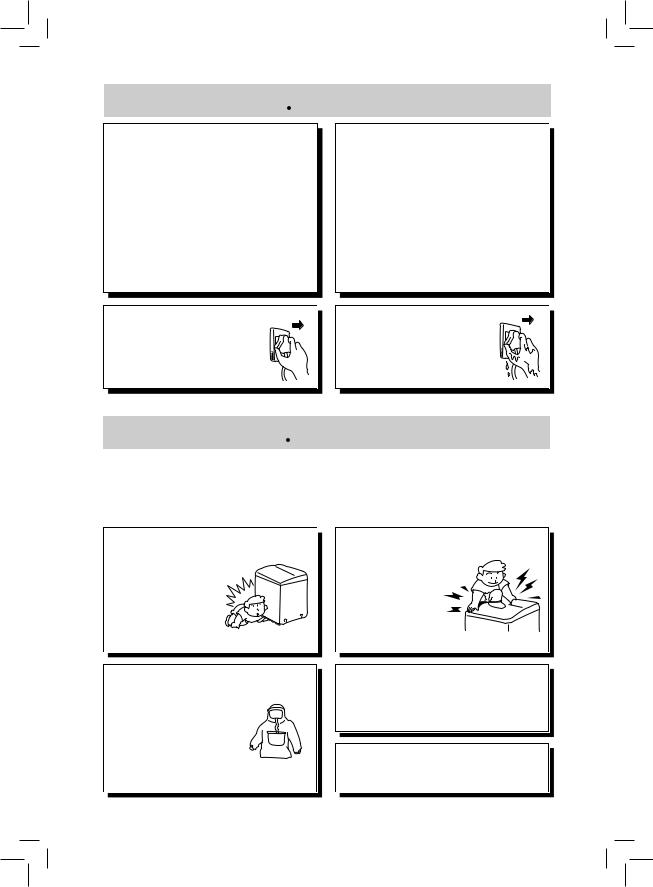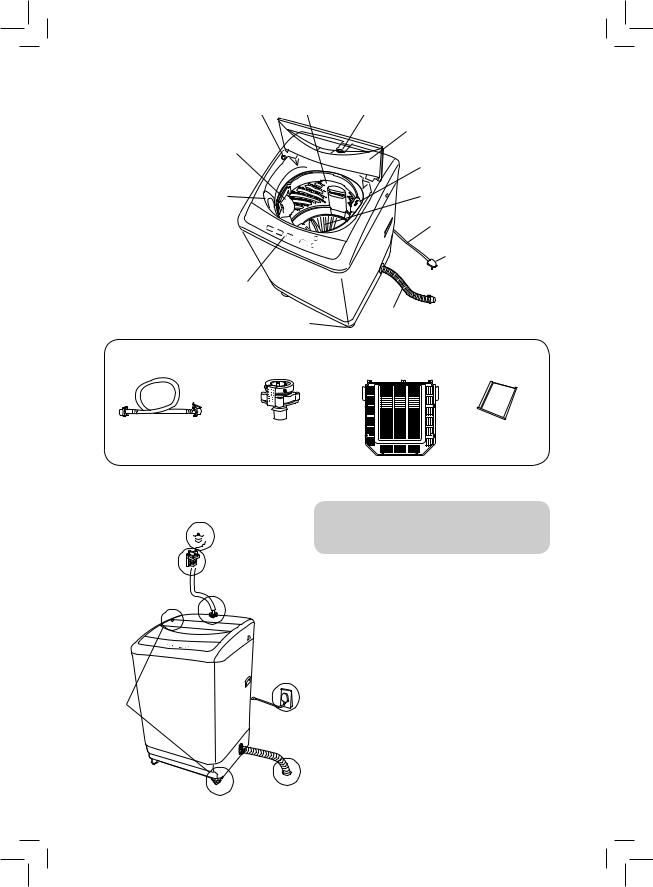Panasonic NA-F62B1, NA-F70B1 User Manual

Fully Automatic Washing Machine
Operating Instructions
Model No. NA-F70B1
NA-F62B1
Thank you very much for purchasing Panasonic Washing Machine.
Before operating this washing machine, please read these instructions completely, paying special attentions to Safety & General Precautions.
W9901-7ECA0
PHAT0802-0
Printed in Thailand
NA-F62-70B1-ENABPS.indd 1 |
5/8/08 9:16:19 AM |

Contents
|
|
ITEM |
PAGE |
|
|
|
|
Safety & General Precautions |
3-4 |
||
Name of parts |
|
5 |
|
Procedures before washing |
5 |
||
Determining load and detergent levels with the Quick Indication |
6 |
||
Laundry Detergent |
|
6 |
|
How to use liquid detergent |
7 |
||
How to use bleach |
|
7 |
|
How to use softener |
|
7 |
|
When putting the softener in or removal of the lint filter is difficult. |
7 |
||
How to use powdered synthetic detergents |
8 |
||
How to use powdered detergent |
8 |
||
“Economy’’ Laundering |
|
8 |
|
Laundry Tips |
|
8 |
|
Operations Panel |
|
9 |
|
Miscellaneous |
|
NORMAL Course |
10 |
Options |
|
SPEEDY Course |
10 |
|
|
DELICATE Course |
11 |
|
|
RESERVE Program (9 hours) |
11 |
CHILD LOCK program |
|
12 |
|
Cancelling end buzzer after washing |
12 |
||
Process setting |
|
13 |
|
Maintenance: TUB HYGIENE Course |
13 |
||
Maintenance: TUB DRY |
14 |
||
Maintenance |
|
14 |
|
Please observe the following Instructions |
15 |
||
Caution |
|
15 |
|
How to install |
|
16 |
|
Install Washing Machine Horizontally |
16 |
||
Connect the water supply hose |
17 |
||
Drain Hose Installation Instruction |
18 |
||
Bottom Cover Installation Instruction |
18 |
||
Troubleshooting |
|
19 |
|
Error Indication |
|
20 |
|
Specification |
|
20 |
|
2
NA-F62-70B1-ENABPS.indd 2 |
5/8/08 9:16:20 AM |

Safety & General Precautions
To prevent the risk of danger or material loss or damage to the user of others, make sure to follow the precautions described below.
WARNING |
CAUTION |
May cause a serious injury or death. |
May cause physical injury or damage other items. |
|
|
|
WARNING |
|
|
Never disassemble, repair or remodel this washing machine.
If you disassemble, repair or remodel the washing machine by yourself, it can cause fire or irregular action that results in injury.
Consult your dealer for repair.
When you are cleaning your washing machine, do not apply water directly to any part of the washing machine.
It will cause short circuit and electric shock.
Do not place the washing machine on a damp place such as in a bathroom or exposed to the outside weather.
There is risk of the insulation deteriorating, electric
shock and overheating, or breakdowns due to rust.
Never touch the laundry with your hand during spin until the tub has completely stopped spinning.
If you touch the laundry, even if the tub is rotating slowly, there is a danger of injury if the laundry
becomes entangled with your hand. Pay particular attention to protecting children from such injury.
Do not place any burning object including burning candles or cigarettes, on top or near the washing machine. 
There is a danger of fire or set deformation.
Please do not wash or spin laundry which stained with gasoline, kerosene, benzine, paint thinner or the likes of it.
There is a risk of explosion or fire burn.
Do not use power plug socket or wiring equipment more than their rated capacity.
When you use the socket or wiring more than its rated capacity by connecting multiple
appliances, it can cause fire due to overheating.
Make sure that the ground is attached to the power supply outlet.
Otherwise, there is a danger of electric shock at the time of machine trouble or electricity has leaked. 
• Be sure to ask your dealer about grounding work.
Never disconnect the power plug by pulling the power cord. Hold the power plug as you pull it out.
There is a danger of an electric shock or short circuit which may cause a fire.
Make sure to push the power plug completely into the power supply outlet.
If the power plug is not completely pushed into the outlet, this may cause electric shock and fire due to overheating.
•Never use a damaged power cord.
3
NA-F62-70B1-ENABPS.indd 3 |
5/8/08 9:16:21 AM |

 WARNING
WARNING
Do not damage the power cord and power plug.
(Do not damage, modify, immoderately bend, twist, pull, or bundle the power cord, do not put the power cord and power plug close to heating appliances, do not put anything heavy on power cord and power plug.)
•If using the damaged power cord it will cause fire and current shortage.
•Consult your dealer about power cord and power plug repairing.
Always pull the power plug out of the power supply before doing cleaning or maintenance of the washing machine.
•Otherwise, there is a risk of electric shock or injury.
Remove any dust which may accumulate around the power cord.
When dust has accumulated on and around the power plug, and the dust gets damp or wet, the insulation plug become defective and may causes a fire. Pull out the power plug, and wipe off dampness with a dry clean laundry.
•If you are not going to use the washing machine for a long period of time, pull the power plug out of the socket.
Do not pull the power plug out of the socket or push in the power plug inside the socket with wet hand.
It will cause electric shock.
 CAUTION
CAUTION
This appliance is not intended for use by persons (including children) with reduced physical, sensory or mental capabilities, or lack of experience and knowledge, unless they have been given supervision or instruction concerning use of the appliance by a person responsible for their safety.
Children should be supervised to ensure that they do not play with the appliance.
Do not put your hand or foot under the washing machine while the machine is operating.
There is a rotating mechanism at the bottom of the machine, so you could be injured.
Do not wash and spin waterproof sheets and garments.
(Example) Raincoats, outfits (coats/jackets and pants) for fishing and skiing, etc.
The items could be damaged or you could be injured due to irregular vibration during the spin cycle.
Do not climb up or put anything heavy on the top of the machine.
You could be injured due to set deformation or breakage of the washing machine.
Always check the hose connection by turning on the water tap before starting washing.
If the fixing screws are loose, it will cause water leakage that could cause unexpected damage.
Do not use water with temperature above 50°C.
•The plastic parts will become deform, resulting in set breakdown.
4
NA-F62-70B1-ENABPS.indd 4 |
5/8/08 9:16:25 AM |

Name of parts
|
Leveller |
Tub |
Feeding Valve |
|
|
|
|
|
Lid |
|
Lint Filter |
|
|
|
|
|
|
|
Softener Inlet |
Bleach / Liquid |
|
|
Pulsator |
|
Detergent Inlet |
|
|
||
|
|
|
||
|
|
|
|
Power Cord |
|
|
|
|
Power Plug |
Operation Panel |
|
|
|
|
|
|
|
|
Drain Hose |
|
Adjustable Leg |
|
|
|
Accessories |
|
|
|
|
Water Supply Hose (1) |
Water Tap Adaptor (1) |
|
Bottom Cover (1) Hose Hole Cover A (1) |
|
Length: 1.0 m |
Note: Water Tap Adaptor is set |
Screw (9) |
||
|
to the Water Supply Hose. |
|
Note: For Bottom Cover |
|
Procedures before washing
• Check the installation
3 
2
4
1
5
[NOTE]
Before installation, please make sure to install the bottom cover. See page 18 for details.
See pages 16~18 for details.
1
2 |
Connect the water supply hose. |
3 |
Turn on the faucet. |
4 |
Plug power cord into socket outlet. |
5 |
Insert the drain hose to drain. |
5
NA-F62-70B1-ENABPS.indd 5 |
5/8/08 9:16:27 AM |

Determining load and detergent levels with the Quick Indication
1Put the laundry into the machine.
Press the [POWER ON] button and then press the [START/ HOLD] button after putting in the laundry.
2Allow the machine to churn the laundry for 5 seconds.
The pulsator operates for about 5 seconds without any water in the tub to measure the amount of laundry. If there is already water in the tub, the machine will not operate and the water level will be set to 51L. (45L in the case of NA-F62B1)
3Detergent volume indications.
A lamp will light up indicating the appropriate water level and amount of detergent according to the laundry. Add this amount of detergent.
9 Detergent indicator
The  indicates the number of scoop of compact powdered laundry detergent formula to be inserted using the measuring scoop in the tub (1 scoop = about 40 grams).
indicates the number of scoop of compact powdered laundry detergent formula to be inserted using the measuring scoop in the tub (1 scoop = about 40 grams).
For information concerning other types of laundry detergent, see the table below.
7 The pulsator operates without water in the washing tub in order to measure the amount of laundry.
•According to laundry load, put in the detergent then close the lid. For better detergent dissolve, put in at the area of water feeding.
7 Change the water level setting in the following cases:
•When placing the wet laundry inside the tub, the water level will be indicated 51L (45L in the case of NA-F62B1) even though the laundry weight is light.
•When you put in light weight laundry or laundry that doesn’t absorb water easily (laundry made of synthetic fiber and mixed fiber, etc.).
Laundry Detergent
Detergent type |
|
Synthetic detergents |
|
Powdered |
|
Concentrated type |
Liquid type |
||||
|
detergent |
||||
|
(25g per 30L of water) |
(25ml per 30L of water) |
(40ml per 30L of water) |
||
|
|
||||
|
|
Concentrated |
Non |
|
|
Water level |
|
Concentrated |
|
||
|
liquid |
Powder |
|||
One measuring scoop |
liquid |
||||
(Laundry |
|
|
|
||
|
|
|
|
||
volume) |
Powder |
|
|
|
|
|
|
|
|
||
(NA-F70B1)
51L 1 1/5 scoops approx. 43ml approx. 68ml approx. 68g (Approx. 7.0kg)
(NA-F62B1)
45L 1 scoop approx. 38ml approx. 60ml approx. 60g (Approx. 6.2kg)
(NA-F70B1)
41L 1 scoop approx. 34ml approx. 55ml approx. 55g (Approx. 3.0kg)
(NA-F62B1)
35L 4/5 scoops approx. 29ml approx. 47ml approx. 47g (Approx. 3.0kg)
30L |
|
|
approx. 25ml |
approx. 40ml |
approx. 40g |
|
(Approx. 1.5kg) |
3/5 |
scoops |
||||
|
|
|
||||
16L |
|
|
approx. 13ml |
approx. 21ml |
approx. 21g |
|
(Approx. 0.3kg) |
2/5 |
scoops |
||||
|
|
|
•The figures in parentheses in the water level column indicate the approximate weight of the laundry load.
•Please use the standard amount of laundry detergent as printed on the detergent container.
•Some laundry detergents have their own prescribed methods of use. Please read the instructions to your laundry detergent.
•When a large quantity of suds is produced, use less detergent or switch to a low-suds detergent.
6
NA-F62-70B1-ENABPS.indd 6 |
5/8/08 9:16:28 AM |
